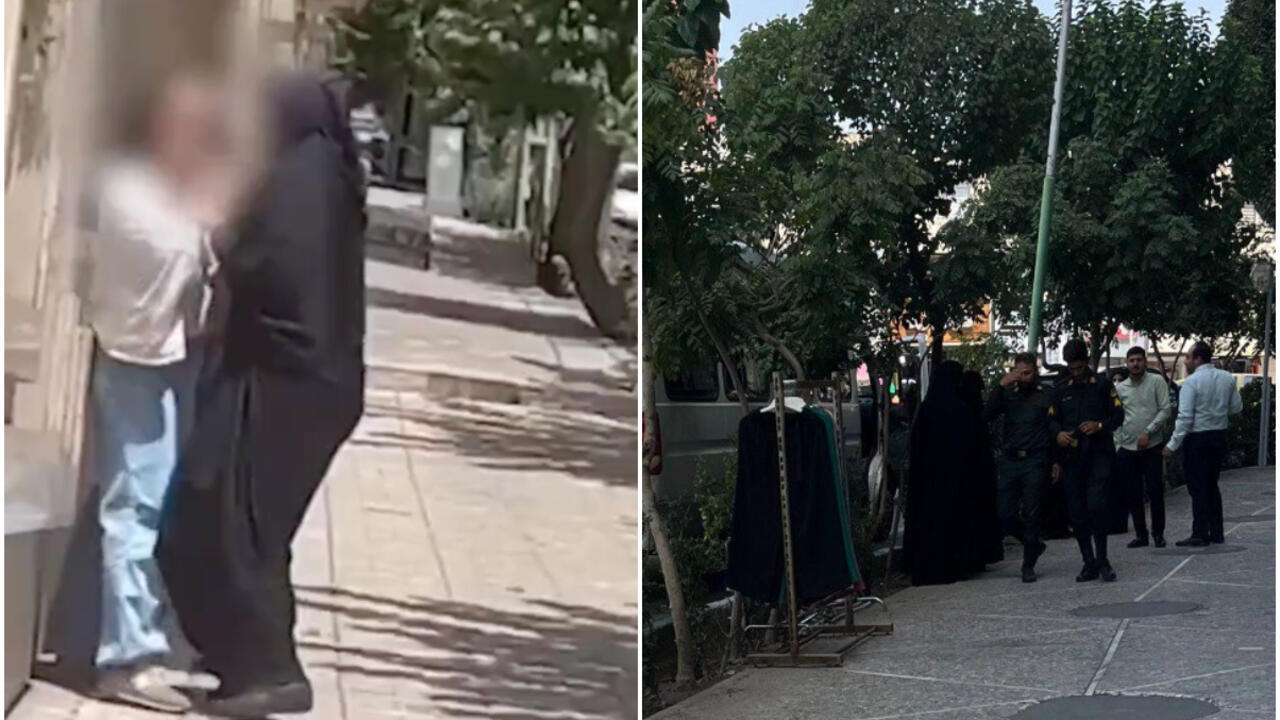Nearly 10 months after Iran’s so-called “morality police” disappeared from the streets during mass protests over the death in custody of Mahsa Amini, the Iranian police announced July 16 that they had resumed patrols targeting “immoral clothing.” Amateur videos and first-hand reports from our Observers in Iran indicate that the patrols had resumed in the days before the announcement. But with many Iranian women having gotten used to going out with their heads uncovered in recent months, it remains unclear whether the patrols will be able to stop them.
Amini, 22, was arrested by members of Iran’s Guidance Patrol on September 13, 2022 for allegedly not wearing a headscarf, and died three days later. Her death sparked months of mass protests that resulted in more than 500 deaths, thousands of injuries, and tens of thousands of demonstrators arrested.
Now the Iranian regime is cracking down.On July 16, Saeed Montazer Al-Mahdi, spokesman for the Iranian police, announced that the morality police would resume conducting morality patrols. “Following massive demand by several groups of people, and the urging of the president and the head of the judiciary to achieve a safer society and enforce family values, police patrols will, from today, alert persons wearing immoral clothing and, if they insist, report them to the courts.”
The protests, under the slogan “Woman, Life, Freedom,” led many Iranian women to refuse to wear the Islamic hijab in public, defying Iran’s mandatory hijab laws. Guidance Patrol units stopped patrolling, and Iran’s regular police had to focus on breaking up the protests, not enforcing hijab rules.
In this video posted on Twitter the man filming says the woman in black is an officer of Iran’s Gasht-e-Ershad morality police making an arrest in the Gisha neighbourhood of north Tehran on July 15, 2023.
Many Iranians on social media report seeing police conducting morality patrols on the streets in recent days. They have posted images showing women with their heads uncovered being stopped by women in black chadors accompanied by uniformed male police officers. Police vehicles are visible in the images, along with unmarked white vans.
Most of the posts on social media report seeing the patrols merely order women to put on a headscarf, but there are also videos suggesting arrests are being made.
Montazer Al-Mahdi did not specifically mention the Guidance Patrol (known as Gasht-e-Ershad in Persian), and it was unclear whether the new patrols are being conducted by regular police or personnel from the religious police unit. Iran’s attorney general had announced in January that the Guidance Patrol was being disbanded, but it was denied by state media.
Iranian authorities have for months been using traffic-surveillance cameras to detect women drivers and passengers without hijabs, and using the vehicles’ licence plates to identify the women and summon them to court to pay fines.
“Young women aren’t afraid of arrest or fines”
Niusha [not her real name], an Iranian woman in Tehran who has refused to wear Islamic clothing in public places for more than a year, explains what is now happening on the streets of Iran:
“I go outside as I please, wearing a T-shirt and shorts. However, I have seen patrols of the morality police in several places in Tehran in the north and in the city centre, although I have not seen or heard of them arresting anyone yet.
I have seen their female officers in black chadors as usual. But now they are in white vans, whereas their vehicles used to be white and green [official colours of Iranian police vehicles].
On the other hand, I know many women who have been summoned to court. The Islamic Republic agents have reported them to the authorities for not wearing Islamic dress in public places and the women have been brought before a judge and are now waiting for their verdict.
The caption of this video posted on Twitter 17 July 2023 says it shows officers of Iran’s morality police checking women for hijab violations in the western city of Kermanshah.
And the number of threatening text messages to women drivers in cars has increased. Traffic cameras are used to check whether the women in the car are wearing an Islamic hijab or not, and if not, they send a text message and fine the car owner, sometimes impounding the car for a while.
But middle-class families who have to go to work every day need their car, and some of them might fold. One of my friends, who has not once worn a headscarf in the last few months, put one in her car as a precaution.
”This video posted on Telegram shows Iranians in the city of Rasht protesting following the arrest of three women on 16 July 2023 for not wearing Islamic hijab on the street.
On July 17, media outlets close to the state claimed a judge in the Tehran province sentenced a woman to work in a morgue in Tehran for not wearing a headscarf in her car.
The Islamic Republic has once again set out to push back Iranian women with the help of police forces, but many political analysts call this latest act a shot in the Islamic Republic’s own knee.
For the extremists, enforcing Islamic hijab is the last bastion before the regime’s collapse
Tara [not her real name] is a political analyst in Iran. She has been arrested several times for her criticism of the Islamic Republic. She is also one of the Iranian women refusing to comply with the Islamic dress code imposed by the mollahs in Tehran. She explains why, just two months before the anniversary of Mahsa Amini’s death and amid an unprecedented crumbling of legitimacy for the regime, the Islamic Republic is adding fuel to the fire after decades of economic, environmental, political, diplomatic and human rights crises.
“As far as I can tell, there is a struggle between different political factions in Iran. There are extremists, including Ahmad-Reza Radan, Iran’s newly appointed police chief, who want to reintroduce the morality police. They have the upper hand. But there are other blocs who, for whatever reason – maybe fear of more mass protests – disagree. Some hardline websites such as Tasnim News and Javan [two media outlets close to Iran’s powerful Islamic Revolutionary Guard Corps, the IRGC] have denied the morality police are being redeployed, saying the amateur images showing such patrols are ‘fake’.
For the extremists, enforcing Islamic hijab on the streets is critical, the last bastion before the regime’s collapse. It’s a way of showing that the regime is still in control. That is why the hardliners have recently organised rallies by their supporters to protest the regime’s lack of initiative to enforce Sharia law in public spaces.
We should not forget that we are approaching the anniversary of Mahsa Amini’s death. Maybe they think that with such a strong presence on the streets they can stop people from marking this day in the coming weeks. But I think that will backfire on them in the end.”



And history will repeat itself unfortunately.